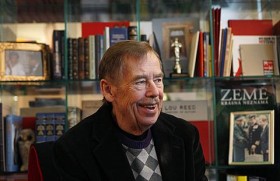 Vaclav Havel , Czech Leader of ’89 ‘Velvet Revolution, dead at 75
Vaclav Havel , Czech Leader of ’89 ‘Velvet Revolution, dead at 75
Vaclav Havel, the former dissident playwright who led Czechoslovakia’s 1989 “Velvet Revolution” against communism and then served as his country’s president, died Sunday.
According to Los Angeles Times News, Havel, a former chain smoker with chronic respiratory problems, had been in failing health the past few months and died at his weekend home in Hradecek in the northern Czech Republic, his assistant, Sabina Tancevova, told the Associated Press.
World leaders mourned his death. Lech Walesa, the former Polish president and Solidarity movement founder, called Havel “a great fighter for the freedom of nations and for democracy” whose “voice of wisdom will be missed.” President Obama said Havel “helped unleash tides of history that led to a united and democratic Europe.”
Of all the heroes of the anti-Communist struggles in Eastern Europe, Havel most successfully navigated the political challenges of democracy and free markets, remaining at the peak of political influence for more than a decade. He was president of Czechoslovakia from December 1989 until July 1992. After the nation split in two and Slovakia went its own way, he served as president of the Czech Republic from 1993 until 2003, just months before the two nations joined the European Union.
Romantic idealism, often expressed in deep philosophical terms, colored his career, whether he was ridiculing communism in his plays or searching for the meaning of life during his time in prison as well as during his presidency.
“The Communist past has left us spiritually impoverished,” he declared in pledging as president to focus on “the ethical, moral aspects of society, on creating space for dialogue, agreement and tolerance.”
As a dissident leader, Havel promoted the slogan, “May truth and love triumph over lies and hatred.” During his years in office he stressed the importance of “civil society,” or citizens’ organizations free of government control, as the underpinning for democracy.
“None of us—as an individual—can save the world as a whole, but . . . each of us must behave as though it were in his power to do so,” Havel wrote in his 1997 book, “The Art of the Impossible: Politics as Morality in Practice.”
As president, Havel sought to guide his country away from its Communist past while avoiding witch hunts against former rulers.
“The transformation of the totalitarian system into a democratic one is not only a matter of several parties replacing one ruling party and the introduction of some democratic mechanisms,” Havel said in a 1994 interview with The Times. “It is also a matter of a great transformation of thinking because people must learn again to be citizens, to rediscover the civic responsibility which the totalitarian regime did not demand from them because it required mere obedience.”
Havel presided over Czechoslovakia’s transition to democracy and a market economy, the 1991 withdrawal of Soviet troops and the Czech Republic’s 1999 entry into the North Atlantic Treaty Organization, which ensured its status in the mainstream of Western institutions. He was repeatedly nominated for the Nobel Peace Prize, received numerous honorary doctorates and was awarded various international honors for his human rights efforts, including the U.S. Presidential Medal of Freedom from President George W. Bush, who hailed him as “one of liberty’s great heroes.”
[adrotate group=”9″]

